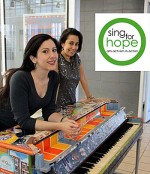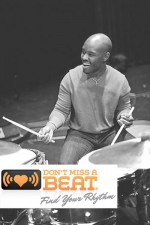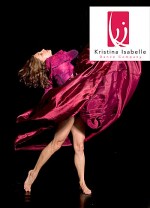Title
After-school programs and summer camp. Shows on stilts. Arts for the underserved. Training programs for the gifted. Theatrical dolls. Basic computer skills. Social-media marketing. Affordable high-quality instruments. Internet hosting services.
Voice alumnae Monica Yunus (left) and Camille Zamora founded a thriving nonprofit called Sing for Hope. Perhaps their highest-profile project took place in 2011, when they had 88 decorated pianos placed in the open in New York City (the pop-up pianos are scheduled to return to the great outdoors this spring).
(Photo by Lekha Singh)Jazz Studies grad Ulysses Owens founded a nonprofit with his family that helps provide arts education in Florida. “Juilliard taught me how to multitask in an intense environment,” Owens says.
(Photo by Scott Mitchell)Body
Niche interests? Volunteer opportunities? Side gigs? The chance to put creativity together with good business practices and move into new professional territory? Yes. Yes. Yes. And, for some Juilliard alumni, a very decided yes. They are the intrepid who have taken risks, explored, experimented, and tried out ideas, then, fortified with a few deep breaths and steeled nerves, embraced what it takes to cross a career threshold—the one marked entrepreneur.
“When I was in high school, I heard the term entrepreneur and associated it with a renegade—independence, crafting your own path,” says drummer Ulysses Owens Jr. (B.M. ’06, jazz studies), who, with his family, founded the nonprofit Don’t Miss a Beat in 2008 to meet the need for after-school and summer arts programs in an economically challenged neighborhood in his native Jacksonville, Fla.
“I had to become an entrepreneur to create something that would help me survive,” says choreographer Kristina Isabelle (B.F.A. ’91, dance), whose commercial entertainment company, Kidco Entertainment (formerly HighJinks Productions), performs with fire—and on stilts and trapezes—for benefits and private and corporate events. The income from Kidco partially supports her nonprofit Kristina Isabelle Dance Company (both entities are based in Columbus, Ohio, and Chicago).
This school year the Juilliard campus has been abuzz with the theme of entrepreneurship: there are courses on career development, production, practical business, and technology; seminars on public speaking and CD marketing; workshops on résumé writing, grant writing, and press kit design; and a new set of grants for student entrepreneurs. No, all the elements are not new, but binding them together with a unified purpose is a fresh concept.
“Writing, speaking, information literacy, and technology as it relates to performance have always been part of the curriculum,” President Joseph W. Polisi recently told The Journal. “But integrating the concept of how to take charge of your own destiny into everything we do at Juilliard is new.” He added that students have always sensed their own entrepreneurial capabilities—“but Juilliard has not always said to them ‘it’s safe to do this and we will help you do it.’ Now we are providing the environment for every student to find more ways to express themselves—and see where it takes them.”
Following My Heart
Owens, Isabelle, and others saw challenge as chance and pioneered moves that have taken them a good long way. “Performers have always been entrepreneurs. Period. End of story. You have to be,” says Monica Yunus (B.M. ’02, M.M. ’04, voice). In 2006, she and her Juilliard friend Camille Zamora (M.M. ’02, voice; Artist Diploma ’04, opera studies) founded the nonprofit Sing for Hope, which puts music and other arts in New York City schools and health-care centers and sponsors arts outreach programs. (One particularly high-profile project was the 2011 open-air piano program in New York City called Play Me I’m Yours.) The roots of Sing for Hope were more simple, though. Yunus was already establishing herself as a soprano at the Metropolitan Opera and elsewhere when she gave a benefit concert in the aftermath of Hurricane Katrina, in 2005. “I remember the next morning realizing that I wanted this to be part of my life. I felt a high that was cathartic,” Yunus says. Things “snowballed. We had lots of conversations. Some people said ‘don’t do it.’”
In only a half dozen years, Sing for Hope has grown to 1,000-plus professional artist-volunteers and a paid staff of five. “Our goal now is to create a sustainable model and replicate it. We have inspired people in other cities [Indianapolis and Miami] already.” As her own operatic career accelerates (she sang Yvette in La Rodine at the Met in January and sings Pamina in Omaha Opera’sMagic Flute on February 22 and 24) Yunus says she “doesn’t think about the division—it’s all singing.”
Organic Journeys
While circumstance and serendipity propel some artists directly into entrepreneurship, others have found their journeys evolving organically. Going back to her own student days at Juilliard, Toby Friedlander Perlman (B.S. ’65, violin) had harbored dreams of a young musicians’ training program, one that would nurture their personal growth as much as their talent. She took mental notes about how to run such a program but it remained only a notion, “sitting there in the prefrontal cortex of my brain, waiting to come out of my mouth,” she says.
Decades later, she was at a community meeting in East Hampton, L.I., and when talk turned from the possibility of establishing a music festival (which did not enthuse her) to setting up a music school, she spoke up: “A school?! I’ll do that.” And that turned out to be the genesis of the Perlman Music Program, which she founded in 1993 with her husband, faculty member Itzhak Perlman (Pre-College ’63; ’68, violin), to foster gifted young string players.
Nita Angeletti’s lifelong love affair with textiles, from which she sculpts elaborate theatrical dolls that have been shown in major galleries and sold to international collectors, started with costumes at Juilliard (she received her drama B.F.A. in 1973). “I was so attracted to all that fabric and color in the costume shop,” she told The Journal. After graduation, she joined John Houseman’s Acting Company (which he’d formed the year before with the first group of Juilliard actors; Angeletti was part of Group 2). She learned flamenco and danced all over the world. And all the while, she kept designing costumes, from hats to shoes. “That’s what fleshes out a character,” she says. Her designs landed in Macy’s holiday windows for five years running. She did fabric collages for fashion houses and interior designers.
“I intended to go back to acting,” Angeletti sighs, then laughs, thinking back, “but I do approach everything as an actress—and acting comes out in the dolls, which are my joie de vivre.” She hesitates over the label entrepreneur, however. “Isn’t that a business term? I feel more like I’m an artist who keeps refining and moving forward, following my heart and feeling a passion for whatever I do.”
In fact with nearly all of these artists, passion generally trumps business plans, at least at the git-go. Faculty member Milica Paranosic (M.M. ’96, composition) was just interested in learning about African drumming and singing at the source, unadulterated by Western ideas and idioms. After the 2008-09 school year, she spent a month at a school in Kopeyia, a small village in Ghana, where she asked how she could help—and was assigned to teach three English classes. The next day, in a classroom with a single power plug, she pulled out a laptop computer, which sparked another level of cultural exchange—and, eventually, a new business for her.
She asked if she could teach music technology, computer fundamentals, and basic computer lessons. “But I didn’t want them to learn any kind of Western [music] theory,” she says of trying to help preserve the students’ indigenous music while giving them the techniques to share it with neighboring villages—and perhaps neighbors on the other side of the world. On a second trip to Kopeyia, armed with six laptops loaded with state-of-the-art software, Paranosic established a computer lab and music technology lab within the school. Back in New York she set up a nonprofit called Give to Grow (she’s working on the business plan at the moment), which she hopes can support semester-long courses in computer literacy and music technology for more students as well as public performances and even an annual festival in Kopeyia as well as similar learning labs elsewhere in Africa.
Striking a Balance
For social entrepreneurs (Paranosic, Yunus, Owens, and others) and those engaged in for-profit businesses, some essentials of the work process and basic skill sets are the same. Multitasking, for instance. “I’m big on multitasking,” says Paranosic, who’s also a composer, performer, and teacher. “I will shift from one [task] to another as a rest.” Yunus agrees: “Multitasking is the order of the day”—and she ticks off other skills she has needed in setting up her business: lining up vendors and specialists (from printers and Web designers to lawyers); finding the right office equipment and personnel; writing brochures, press releases, and the all-important business plan (as well as grant proposals and personal appeals letters for nonprofits); negotiating contracts; making budgets; and long-term planning.
Through trial and error, listening, and watching others do what she wanted to do, Kristina Isabelle “figured out how to make a dance business,” while an arts-administration mentor helped her build a board and pro bono team for her nonprofit. “With both [companies] I get to be creative,” she says. And the mechanics of “working out budgets, casts, and schedules are the same.”
For oboist and English horn player ToniMarie Marchioni (M.M. ’07, D.M.A. ’12, oboe), the impetus to start a side business came as she was finishing her doctorate last year. While helping a music director friend bridge some audience-building gaps through her long-term knowledge of social media (she was an undergrad at Harvard when Facebook was launched), Marchioni realized that she could help other people use Twitter and Facebook more effectively—and make some extra money while continuing her active performing and teaching careers.
She decided to create ToniMarieMedia and last spring she received one of Juilliard’s inaugural Madrigano grants—a program designed to help Juilliard entrepreneurs—which helped her with startup costs. “The first time I felt like this was real was going to City Hall and applying for my business license,” she says. “But I guess the seeds had been growing for a while.” The trick, she toldThe Journal, is that “I have to be creative not just as a business owner but in how I put my life together.”
It’s a similar balancing act for Rozanna Weinberger (M.M. ’82, viola), who through her commercial venture, Rozanna’s Violins, sells high-quality, good-value string instruments for students and professionals. “In my case, a business enterprise empowered me in performance. I went through a period when I was kind of ashamed of my alter ego” as an entrepreneur, Weinberger says. In the start-up stage she mustered courage to show at least some of her business ideas to others for feedback. “It was kind of brutal—to hear even the lousy stuff from friends and enemies.” But while Weinberger says she “never fit in a cookie cutter,” she found that building a business forced her to be an artist—and a teacher. In order to demonstrate her instruments, she says, “I have to go out in front of students.” She streamlined her marketing strategy—emphasizing the collectible factor of her instruments plus design and sound that would be attractive to children. “I premiered concertos, produced concerts and videos with [coordinated] costume and instrument design.” It worked. Now she works around the globe, fills orders from major chains—and still makes time for teaching and performing.
Lessons Learned at Juilliard
A common thread runs through these success stories—lessons learned at Juilliard that apply in an entrepreneur’s everyday world. “I wouldn’t be taken as seriously if I hadn’t honed my skill as a performer,” Weinberger says. “I learned to pursue excellence.” Nita Angelleti uses similar language, citing her takeaway life lesson from Juilliard as “discipline and honing a craft. The more you do it, the better you get.” Monica Yunus feels the same way: “Juilliard prepared me for how to present myself,” she says. “That’s important no matter what you do. You have to scrutinize weaknesses and build up strengths.” For some it gets down to the very practical. “Juilliard taught me how to multitask in an intense environment,” Ulysses Owens says, adding that a day’s tasks might include negotiating a contract with the city, finding an affordable 15-passenger van, recruiting artist-mentors, and performing at a benefit. Kristina Isabelle says her Juilliard training has helped her synthesize, specifically to “figure out the questions you need to ask of the right people.”
Whether choosing to remain with artistic endeavors or move to other fields, Juilliard training can be a foundation. Zachary Smith (B.M. ’01, double bass) did computer work on the side throughout his student days and by the time he graduated, he had decided to try something besides professional musicianship. “But the primary skills, whether for performance or business, are the same,” he says. “The preparation is extremely important, the work that nobody sees.” In other words, all those hours in a practice room. “There is no such thing as instant success,” he adds. Now a vice president of hosting services at Internap, a computer consultancy, he has sorted out needs in the financial community, created businesses that answer the needs and then sold them. If you want to be an entrepreneur, be committed, don’t be afraid to fail, re-evaluate constantly, and hire people smarter than you are, he advises. “You will sacrifice a lot along the way. Dig deeper. Be realistic with yourself. Do you have the fortitude to do it?” Smith asks. He pauses and then says with confidence, “Juilliard people probably know all this. Even better than a typical business person.”







